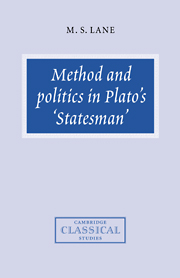Part III - Politics
Published online by Cambridge University Press: 12 September 2009
Summary
Introduction
The fundamental political perspective explored in the Statesman is the authority of political expertise (considered a form of knowledge) in a dynamic temporal context. This theme accounts for its obsessions as well as for its limitations: its treatment of conflict, law, persuasion and possibility are all relative to, and radically shaped by, the fundamental and exclusive commitment to the authority of political expertise. (The construction of the dialogue as a whole reflects its own methodological commitment to the teleological, and so provisional, pursuit of inquiry.) The statesman is a cypher. His only relevant characteristic is the possession of the right sort of knowledge, and no interest is taken in his acquisition of, emotion about, or motivation in utilising this knowledge to rule.
Such sustained argument about the nature of the political expert's authority as related to the nature of his knowledge, is unique to the Statesman. That there is such a thing as political expertise (a politikē technē) is explored and asserted in other dialogues. That knowledge should have political authority – that because philosophical knowledge of the Good is required to order the soul and the city, philosophical knowledge should be ipso facto politically authoritative – is the burden of the Republic. That political knowledge (technē) should be used in forming the laws – and that the authority of the laws, its nature and mode of exercise, is therefore the authority which matters – is the burden of the Laws.
- Type
- Chapter
- Information
- Method and Politics in Plato's Statesman , pp. 137 - 202Publisher: Cambridge University PressPrint publication year: 1998

